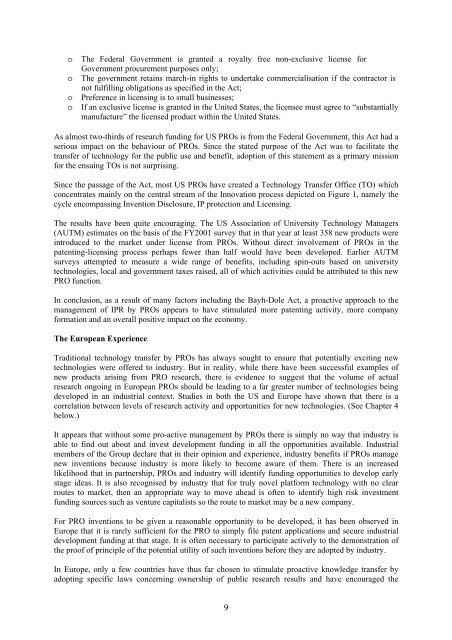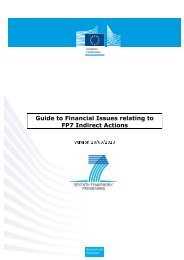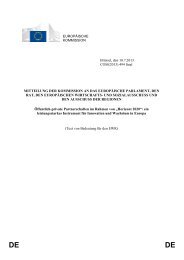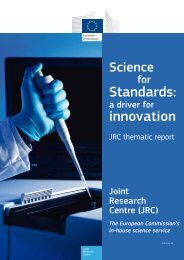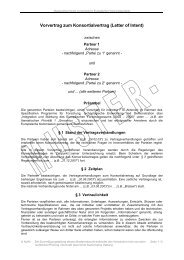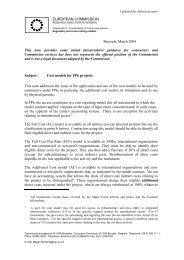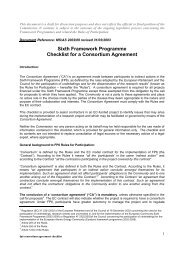Expert Group Report Management of Intellectual Property in ... - KoWi
Expert Group Report Management of Intellectual Property in ... - KoWi
Expert Group Report Management of Intellectual Property in ... - KoWi
You also want an ePaper? Increase the reach of your titles
YUMPU automatically turns print PDFs into web optimized ePapers that Google loves.
o The Federal Government is granted a royalty free non-exclusive license for<br />
Government procurement purposes only;<br />
o The government reta<strong>in</strong>s march-<strong>in</strong> rights to undertake commercialisation if the contractor is<br />
not fulfill<strong>in</strong>g obligations as specified <strong>in</strong> the Act;<br />
o Preference <strong>in</strong> licens<strong>in</strong>g is to small bus<strong>in</strong>esses;<br />
o If an exclusive license is granted <strong>in</strong> the United States, the licensee must agree to “substantially<br />
manufacture” the licensed product with<strong>in</strong> the United States.<br />
As almost two-thirds <strong>of</strong> research fund<strong>in</strong>g for US PROs is from the Federal Government, this Act had a<br />
serious impact on the behaviour <strong>of</strong> PROs. S<strong>in</strong>ce the stated purpose <strong>of</strong> the Act was to facilitate the<br />
transfer <strong>of</strong> technology for the public use and benefit, adoption <strong>of</strong> this statement as a primary mission<br />
for the ensu<strong>in</strong>g TOs is not surpris<strong>in</strong>g.<br />
S<strong>in</strong>ce the passage <strong>of</strong> the Act, most US PROs have created a Technology Transfer Office (TO) which<br />
concentrates ma<strong>in</strong>ly on the central stream <strong>of</strong> the Innovation process depicted on Figure 1, namely the<br />
cycle encompass<strong>in</strong>g Invention Disclosure, IP protection and Licens<strong>in</strong>g.<br />
The results have been quite encourag<strong>in</strong>g. The US Association <strong>of</strong> University Technology Managers<br />
(AUTM) estimates on the basis <strong>of</strong> the FY2001 survey that <strong>in</strong> that year at least 358 new products were<br />
<strong>in</strong>troduced to the market under license from PROs. Without direct <strong>in</strong>volvement <strong>of</strong> PROs <strong>in</strong> the<br />
patent<strong>in</strong>g-licens<strong>in</strong>g process perhaps fewer than half would have been developed. Earlier AUTM<br />
surveys attempted to measure a wide range <strong>of</strong> benefits, <strong>in</strong>clud<strong>in</strong>g sp<strong>in</strong>-outs based on university<br />
technologies, local and government taxes raised, all <strong>of</strong> which activities could be attributed to this new<br />
PRO function.<br />
In conclusion, as a result <strong>of</strong> many factors <strong>in</strong>clud<strong>in</strong>g the Bayh-Dole Act, a proactive approach to the<br />
management <strong>of</strong> IPR by PROs appears to have stimulated more patent<strong>in</strong>g activity, more company<br />
formation and an overall positive impact on the economy.<br />
The European Experience<br />
Traditional technology transfer by PROs has always sought to ensure that potentially excit<strong>in</strong>g new<br />
technologies were <strong>of</strong>fered to <strong>in</strong>dustry. But <strong>in</strong> reality, while there have been successful examples <strong>of</strong><br />
new products aris<strong>in</strong>g from PRO research, there is evidence to suggest that the volume <strong>of</strong> actual<br />
research ongo<strong>in</strong>g <strong>in</strong> European PROs should be lead<strong>in</strong>g to a far greater number <strong>of</strong> technologies be<strong>in</strong>g<br />
developed <strong>in</strong> an <strong>in</strong>dustrial context. Studies <strong>in</strong> both the US and Europe have shown that there is a<br />
correlation between levels <strong>of</strong> research activity and opportunities for new technologies. (See Chapter 4<br />
below.)<br />
It appears that without some pro-active management by PROs there is simply no way that <strong>in</strong>dustry is<br />
able to f<strong>in</strong>d out about and <strong>in</strong>vest development fund<strong>in</strong>g <strong>in</strong> all the opportunities available. Industrial<br />
members <strong>of</strong> the <strong>Group</strong> declare that <strong>in</strong> their op<strong>in</strong>ion and experience, <strong>in</strong>dustry benefits if PROs manage<br />
new <strong>in</strong>ventions because <strong>in</strong>dustry is more likely to become aware <strong>of</strong> them. There is an <strong>in</strong>creased<br />
likelihood that <strong>in</strong> partnership, PROs and <strong>in</strong>dustry will identify fund<strong>in</strong>g opportunities to develop early<br />
stage ideas. It is also recognised by <strong>in</strong>dustry that for truly novel platform technology with no clear<br />
routes to market, then an appropriate way to move ahead is <strong>of</strong>ten to identify high risk <strong>in</strong>vestment<br />
fund<strong>in</strong>g sources such as venture capitalists so the route to market may be a new company.<br />
For PRO <strong>in</strong>ventions to be given a reasonable opportunity to be developed, it has been observed <strong>in</strong><br />
Europe that it is rarely sufficient for the PRO to simply file patent applications and secure <strong>in</strong>dustrial<br />
development fund<strong>in</strong>g at that stage. It is <strong>of</strong>ten necessary to participate actively to the demonstration <strong>of</strong><br />
the pro<strong>of</strong> <strong>of</strong> pr<strong>in</strong>ciple <strong>of</strong> the potential utility <strong>of</strong> such <strong>in</strong>ventions before they are adopted by <strong>in</strong>dustry.<br />
In Europe, only a few countries have thus far chosen to stimulate proactive knowledge transfer by<br />
adopt<strong>in</strong>g specific laws concern<strong>in</strong>g ownership <strong>of</strong> public research results and have encouraged the<br />
9


